Java 8 Convert a String to LocalDate Example
Hello readers, in this tutorial, we will learn how to convert a given response string into a java.time.LocalDate object.
1. Introduction
These days in the programming universe Date and Time handling are the most time-consuming tasks in Java. In the ancient Java world, developers were dependent on the complex SimpleDateFormat class to convert and format the Date strings into the actual Date objects.
For meeting the Date conversion and formatting needs, JDK developers have introduced the new thread-safe DateTimeFormatter class in Java 8. Programmers will have to use the parse() method of the java.time.DateTimeFormatter class for converting a String date to a LocalDate. Let’s see the simple code snippet that shows this implementation.
Code Snippet
LocalDate date = LocalDate.parse("2017-02-05");
System.out.println("Parsed Date?= " + date);
Now, open up the Eclipse Ide and we will see how to convert a particular format Date string to a LocalDate object.
2. Java8 Convert a String to LocalDate Example
2.1 Tools Used
We are using Eclipse Oxygen, JDK 1.8 and Maven.
2.2 Project Structure
Firstly, let’s review the final project structure if you’re confused about where you should create the corresponding files or folder later!
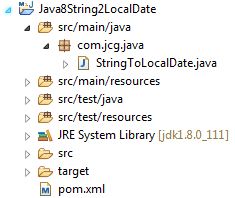
2.3 Project Creation
This section will show how to create a Java-based Maven project with Eclipse. In Eclipse IDE, go to File -> New -> Maven Project.
In the New Maven Project window, it will ask you to select project location. By default, ‘Use default workspace location’ will be selected. Select the ‘Create a simple project (skip archetype selection)’ check-box and just click on next button to proceed.
It will ask you to ‘Enter the group and the artifact id for the project’. We will input the details as shown in the below image. The version number will be by default: 0.0.1-SNAPSHOT.
Click on Finish and the creation of a maven project is completed. If you see, it has downloaded the maven dependencies and a pom.xml file will be created. It will have the following code: pom.xml
<project xmlns="http://maven.apache.org/POM/4.0.0" xmlns:xsi="http://www.w3.org/2001/XMLSchema-instance" xsi:schemaLocation="http://maven.apache.org/POM/4.0.0 http://maven.apache.org/xsd/maven-4.0.0.xsd"> <modelVersion>4.0.0</modelVersion> <groupId>Java8String2LocalDate</groupId> <artifactId>Java8String2LocalDate</artifactId> <version>0.0.1-SNAPSHOT</version> <packaging>jar</packaging> </project>
Developers can start adding the dependencies that they want. Let’s start building the application!
3. Application Building
Below are the steps involved in explaining this tutorial.
3.1 Java Class Implementation
Let’s create the required Java files. Right-click on the src/main/java folder, New -> Package.
A new pop window will open where we will enter the package name as: com.jcg.java.
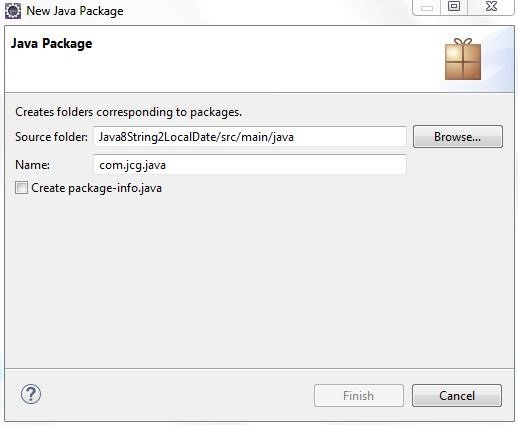
Once the package is created in the application, we will need to create the implementation class to show the usage of parse() method of the java.time.DateTimeFormatter class. Right-click on the newly created package: New -> Class.
A new pop window will open and enter the file name as: StringToLocalDate. The implementation class will be created inside the package: com.jcg.java.
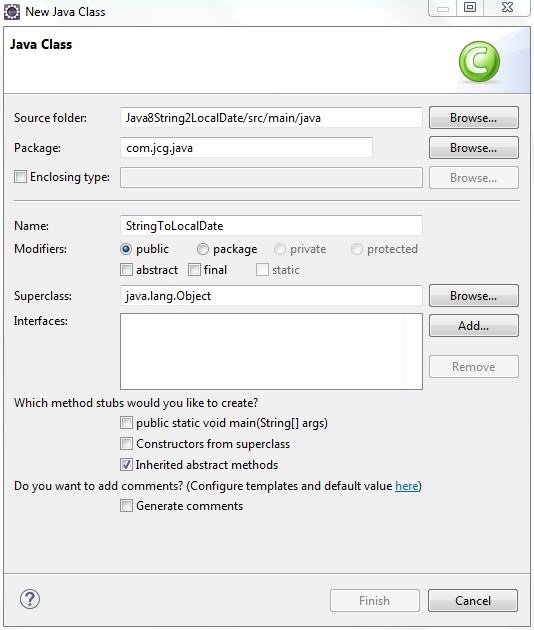
3.1.1 Example of converting a Date string to LocalDate object
Here is the complete Java program to show the parsing of a formatted String to a LocalDate object in Java. Do note,
- We start by creating a Date string with value as
22-Apr-2017 - The given date format is communicated to the Java8 Date-Time API using the
ofPatternmethod of theDateTimeFormatterclass ofPatternmethod returns theDateTimeFormatterinstance having the required date format set in it- Programmers pass the original date string and the date formatter as an input argument to the
LocalDate.parse()method. This method returns theLocalDateinstance and programmers use this object to do other operations
Let’s see the simple code snippet that shows this implementation.
StringToLocalDate.java
package com.jcg.java;
import java.time.LocalDate;
import java.time.format.DateTimeFormatter;
public class StringToLocalDate {
public static void main(String[] args) {
String date = "";
LocalDate localDate = null;
DateTimeFormatter formatter = null;
// Converting 'dd-MMM-yyyy' String format to LocalDate
date = "22-Apr-2017";
formatter = DateTimeFormatter.ofPattern("dd-MMM-yyyy");
localDate = LocalDate.parse(date, formatter);
System.out.println("Input Date?= "+ date);
System.out.println("Converted Date?= "+ localDate + "\n");
// Converting 'EEEE, MMM d yyyy' String format to LocalDate
date = "Saturday, Apr 22 2017";
formatter = DateTimeFormatter.ofPattern("EEEE, MMM d yyyy");
localDate = LocalDate.parse(date, formatter);
System.out.println("Input Date?= "+ date);
System.out.println("Converted Date?= "+ localDate + "\n");
// Converting 'dd/MM/YY' String format to LocalDate
date = "22/04/17";
formatter = DateTimeFormatter.ofPattern("dd/MM/yy");
localDate = LocalDate.parse(date, formatter);
System.out.println("Input Date?= "+ date);
System.out.println("Converted Date?= " + localDate + "\n");
// Converting 'YYYYMMDD' String format to LocalDate
date = "20170422";
formatter = DateTimeFormatter.BASIC_ISO_DATE;
localDate = LocalDate.parse(date, formatter);
System.out.println("Input Date?= "+ date);
System.out.println("Converted Date?= " + localDate);
}
}
Do remember to pass the correct MMM flag in the Date Format. The below exception trace is generated if we are passing anything other than the specified nomenclature.
Exception in thread "main" java.time.format.DateTimeParseException: Text '22-APR-2017' could not be parsed at index 3 at java.time.format.DateTimeFormatter.parseResolved0(DateTimeFormatter.java:1948) at java.time.format.DateTimeFormatter.parse(DateTimeFormatter.java:1850) at java.time.LocalDate.parse(LocalDate.java:400) at StringToLocalDate.main(StringToLocalDate.java:15)
4. Run the Application
To run the application, developers need to right-click on the class, Run As -> Java Application. Developers can debug the example and see what happens after every step!
5. Project Demo
The above code shows the following logs as output.
# Logs for 'StringToLocalDate' # ================================ Input Date?= 22-Apr-2017 Converted Date?= 2017-04-22 Input Date?= Saturday, Apr 22 2017 Converted Date?= 2017-04-22 Input Date?= 22/04/17 Converted Date?= 2017-04-22 Input Date?= 20170422 Converted Date?= 2017-04-22
That’s all for this post. Happy Learning!
6. Conclusion
In this tutorial, we had an in-depth look at the Java8 LocalDate.parse() method for parsing a String to LocalDate. Developers can download the sample application as an Eclipse project in the Downloads section. I hope this article served you with what developers are looking for.
7. Download the Eclipse Project
This was an example of converting a String Date to LocalDate in Java8.
You can download the full source code of this example here: Java8String2LocalDate

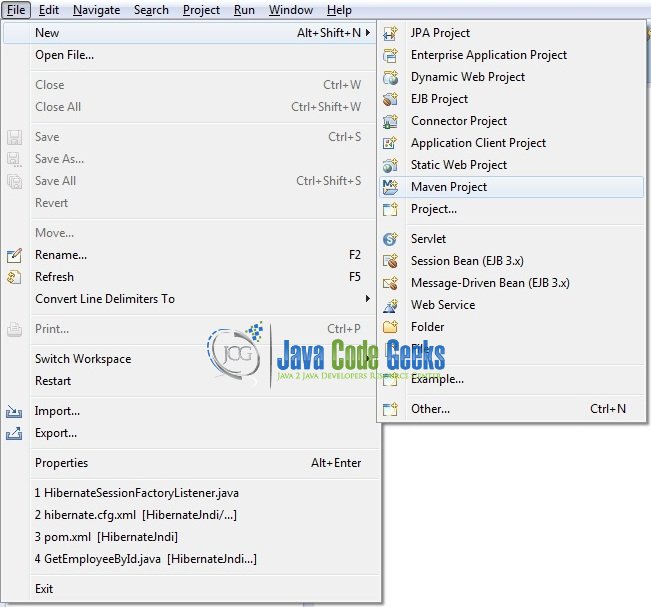
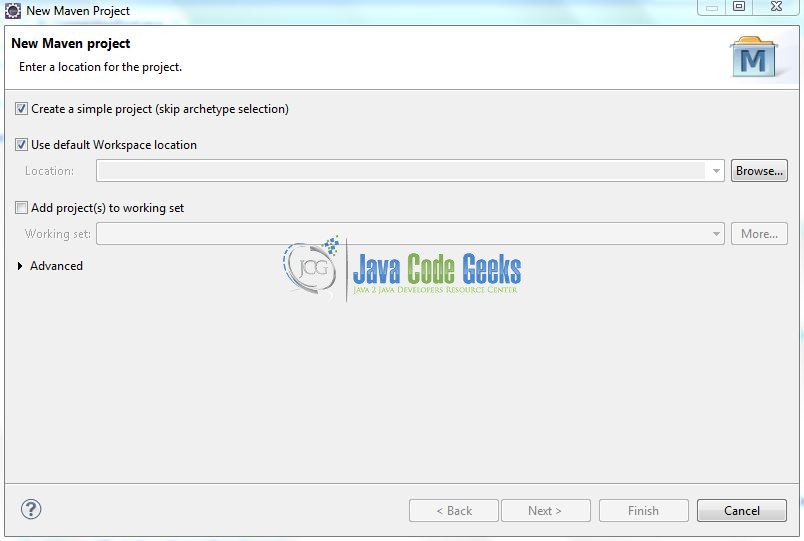
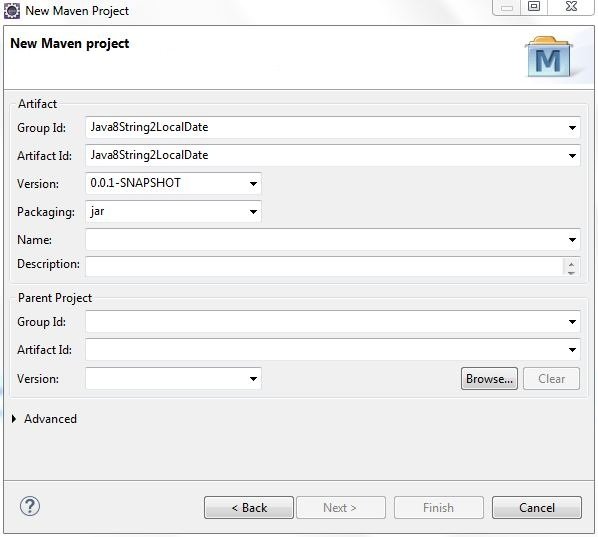



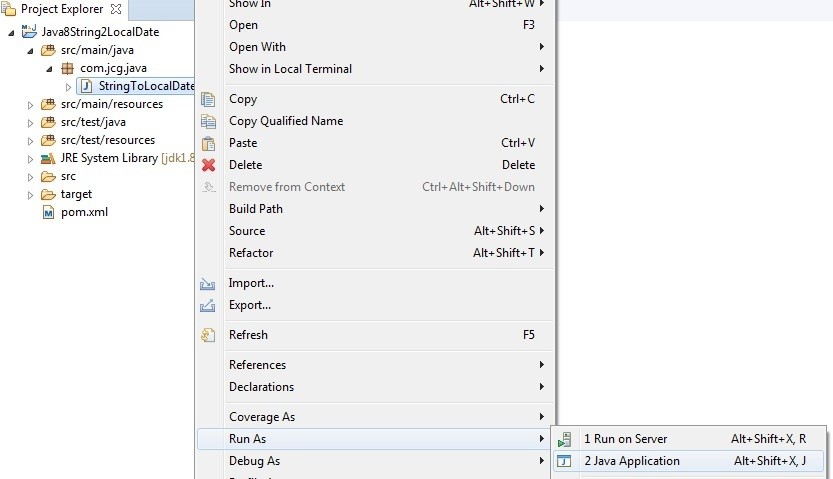


I was just working with Dates in Java the other day. I wish I had seen this post earlier!
Keep following the other posts @JoeHx. More Java 8 tutorials to follow.